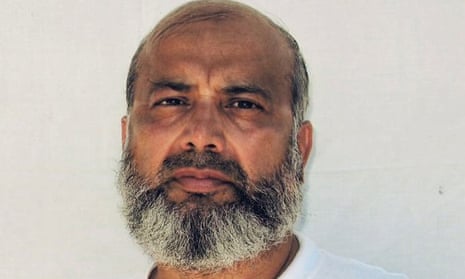Oldest Guantánamo prisoner released after 17 years
Saifullah Paracha, 75, returns to Pakistan after being held, but never charged, over suspected al-Qaida ties

A 75-year-old Pakistani man who was the oldest prisoner at the Guantánamo Bay detention centre, has been released and returned home, the foreign ministry in Islamabad said.
Saifullah Paracha was reunited with his family after more than 17 years in custody at the US base in Cuba, it said.
Paracha had been held since 2003 on suspicion of having links with al-Qaida, but was never charged with a crime. He was notified that his release had been approved in May 2021 having been cleared by the prisoner review board, along with two other men, in November 2020.
As is customary, the notification did not provide detailed reasons for the decision and concluded only that Paracha was “not a continuing threat” to the US, according to Shelby Sullivan-Bennis, who represented him at his hearing at the time.
In Pakistan, the foreign affairs ministry said it had completed an extensive inter-agency process to facilitate Paracha’s repatriation.
“We are glad that a Pakistani citizen detained abroad is finally reunited with his family,” it said.
Shelby Sullivan-Bennis, Paracha’s lawyer, said: “Saifullah Paracha’s long-awaited return home cuts both ways. It is an indescribable blessing and a tragic reminder of how America’s fear following 9/11 led us to the depths of human depravity, ripping apart families and holding its members in prison for decades, only to be released following ‘wrongful conviction’ judgments, and many without any trial whatsoever.
“There is no such thing as justice deferred, and after nearly 20 years languishing in an offshore prison – held without charge or trial – to be returned home at age 75 to live out his twilight years with his family, that is what we have here.”
Michael Kugelman, a south Asia expert at the Washington-based Woodrow Wilson International Center for Scholars, said: “Paracha’s release was in the works for quite some time, but for it to come now is a big win for a Pakistani government that’s struggled to deliver good news. It could also work as a confidence-building measure for US-Pakistan relations at a moment when the relationship has already enjoyed some momentum.”
Reprieve, a UK-based human rights charity, described Paracha as a “forever prisoner”.
Paracha, who lived in the US and owned property in New York City, was a wealthy businessperson in Pakistan. Authorities alleged he was an al-Qaida “facilitator” who helped two of the conspirators in the 11 September 2001 terrorism attack with a financial transaction.
He has maintained that he did not know they were with al-Qaida and denied any involvement in terrorism.
The US captured Paracha in Thailand in 2003 and had held him at Guantánamo since September 2004. Washington has long asserted that it can hold detainees indefinitely without charge under the international laws of war.
In November 2020, Paracha, who has a heart condition and diabetes among other conditions, made his eighth appearance before the review board. It was established under Barack Obama to try to prevent the release of prisoners who authorities believed might engage in anti-US hostilities upon their release from Guantánamo.
At the time, Sullivan-Bennis said she was more optimistic about his prospects because of Joe Biden’s election, her client’s ill health and developments in a legal case involving his son, Uzair Paracha.
The son was convicted in 2005 in federal court in New York of providing support to terrorism, based in part on testimony from the same witnesses held at Guantánamo whom the US relied on to justify holding the father. In March 2020, after a judge threw out those witness accounts and the US government decided not to seek a new trial, the younger Paracha was released and sent back to Pakistan.






Comments
Post a Comment